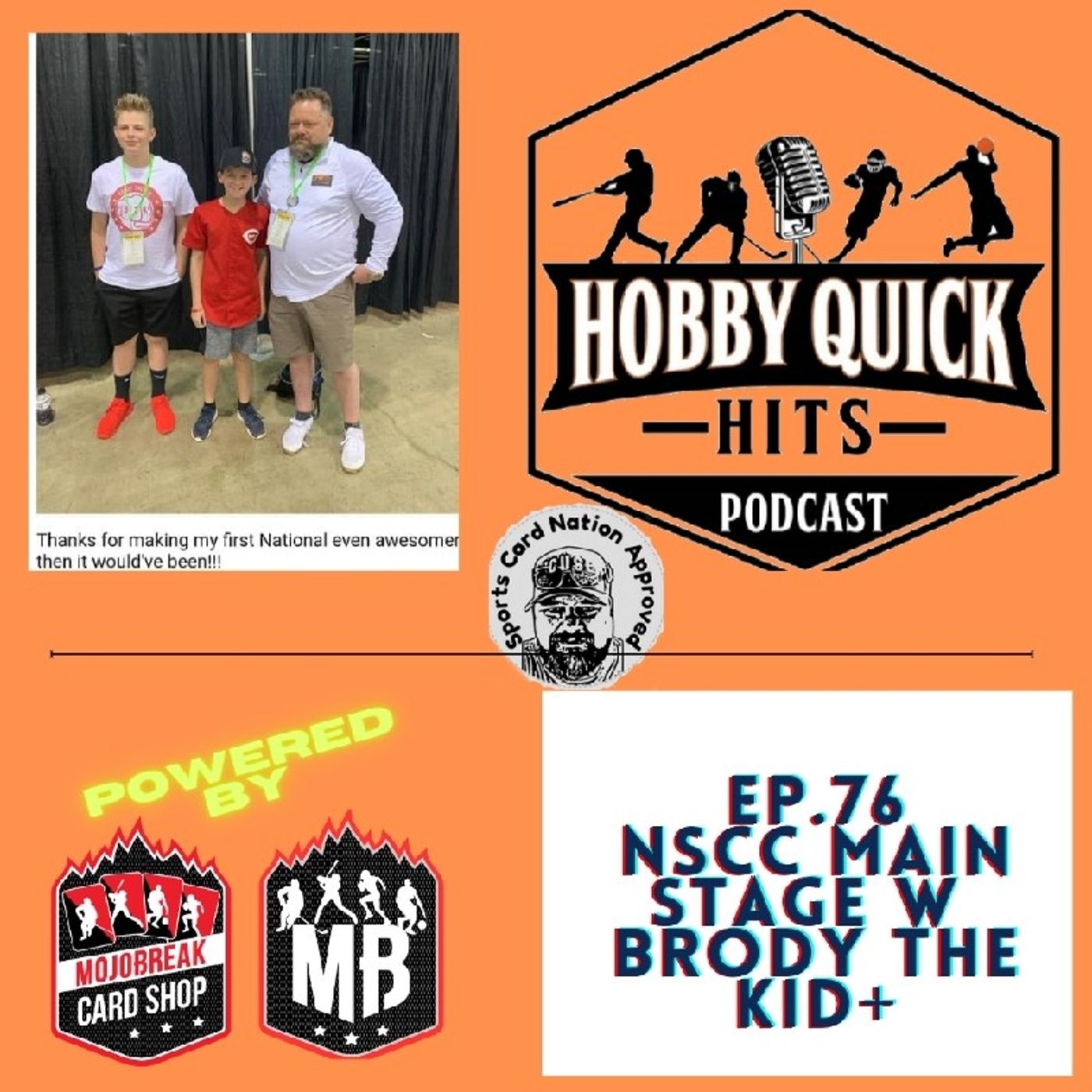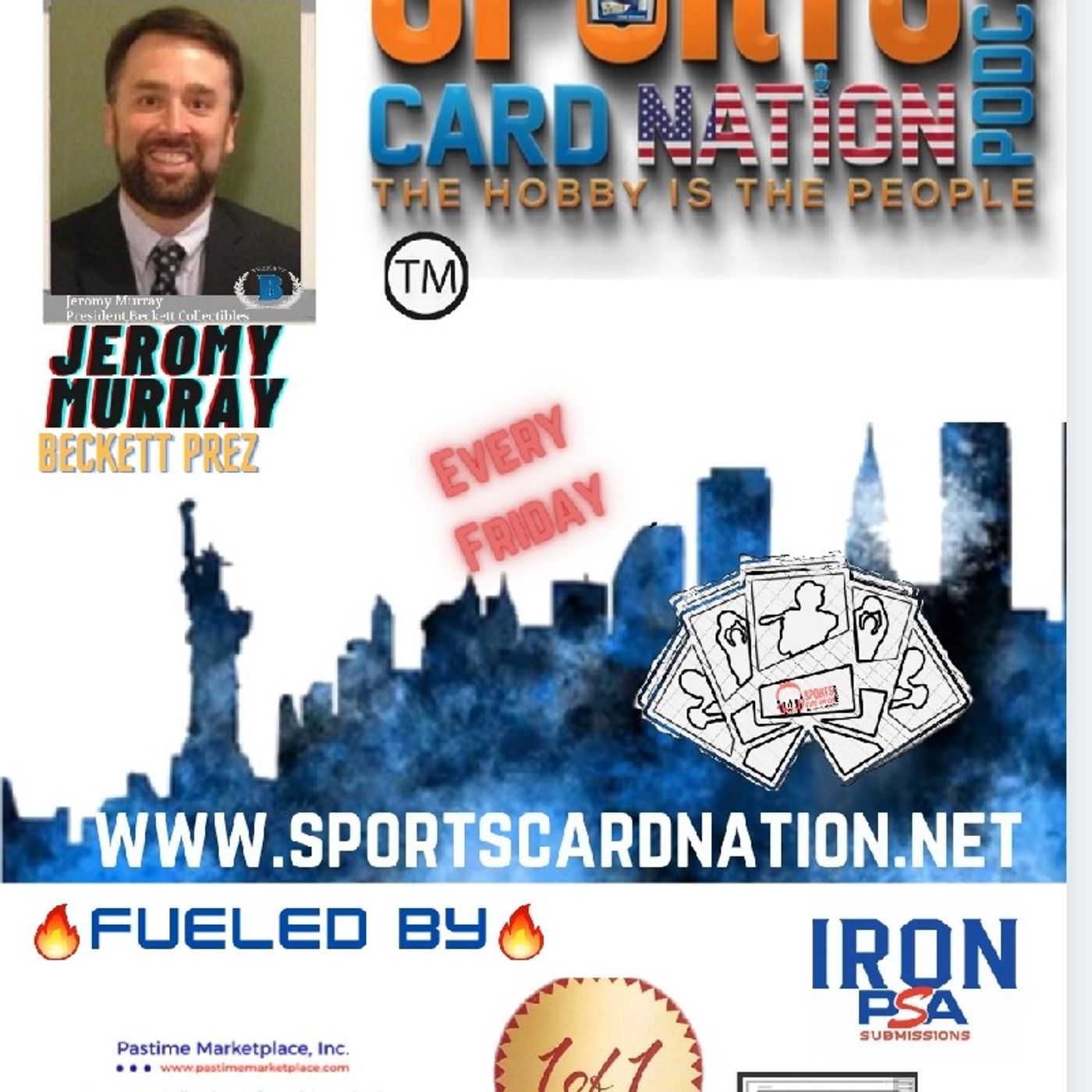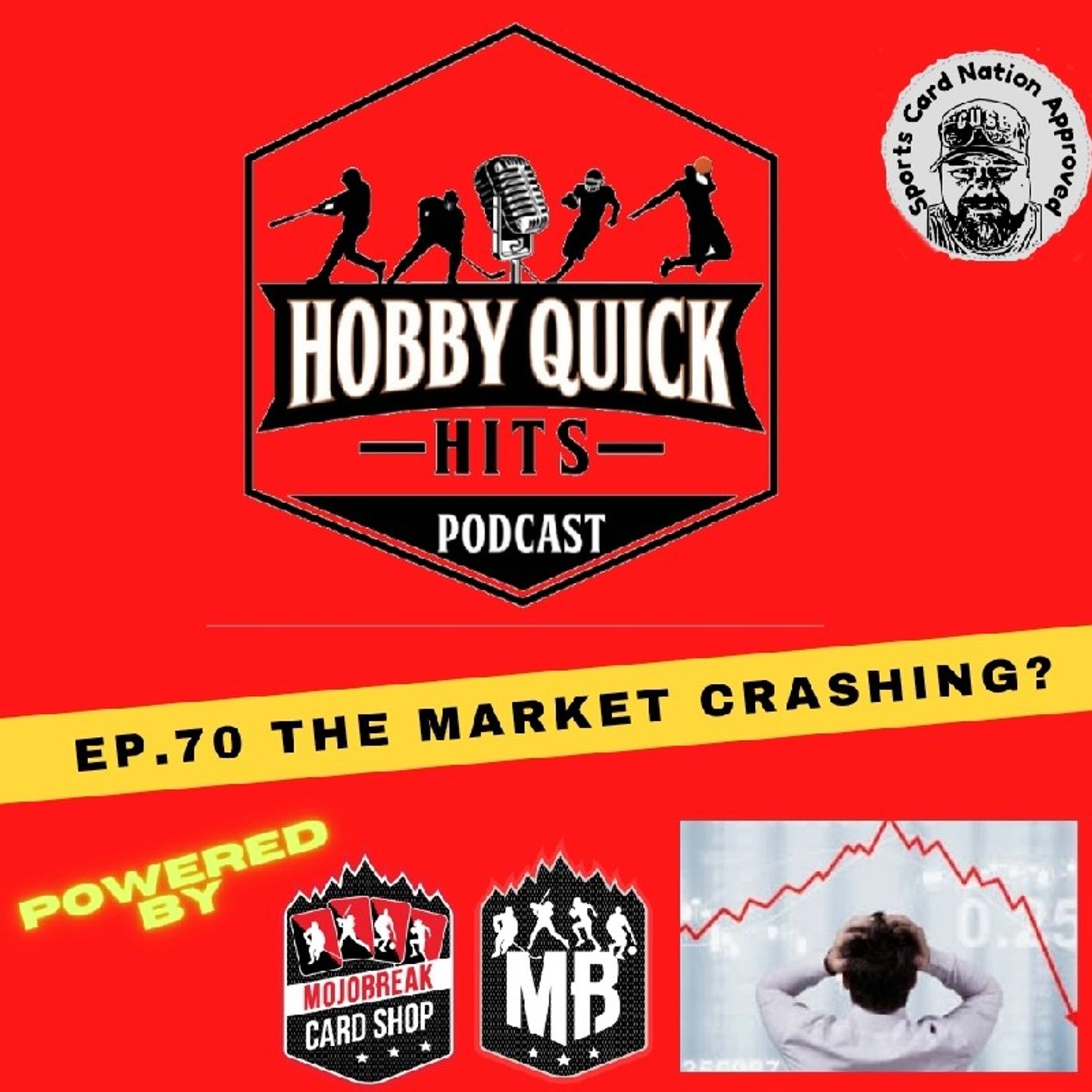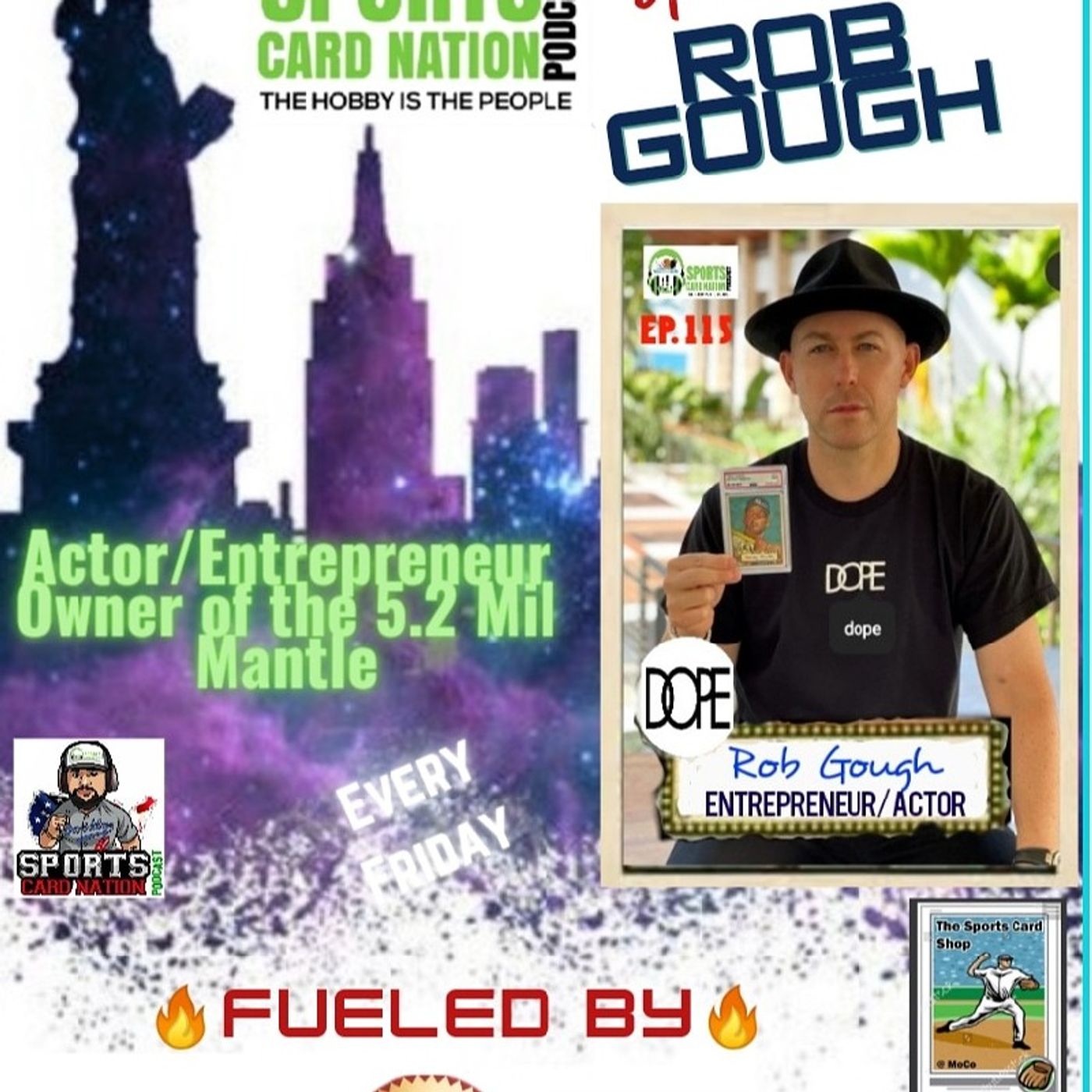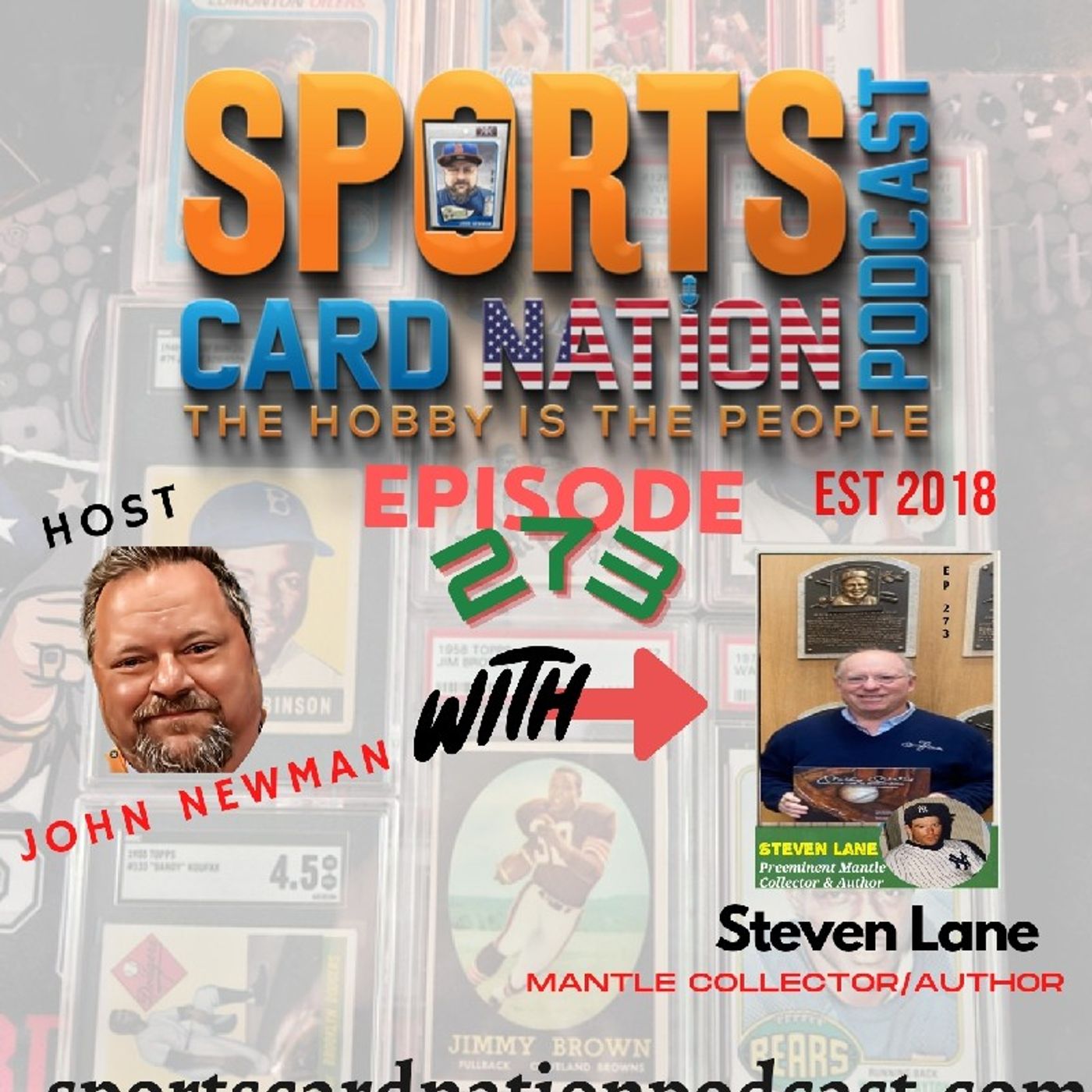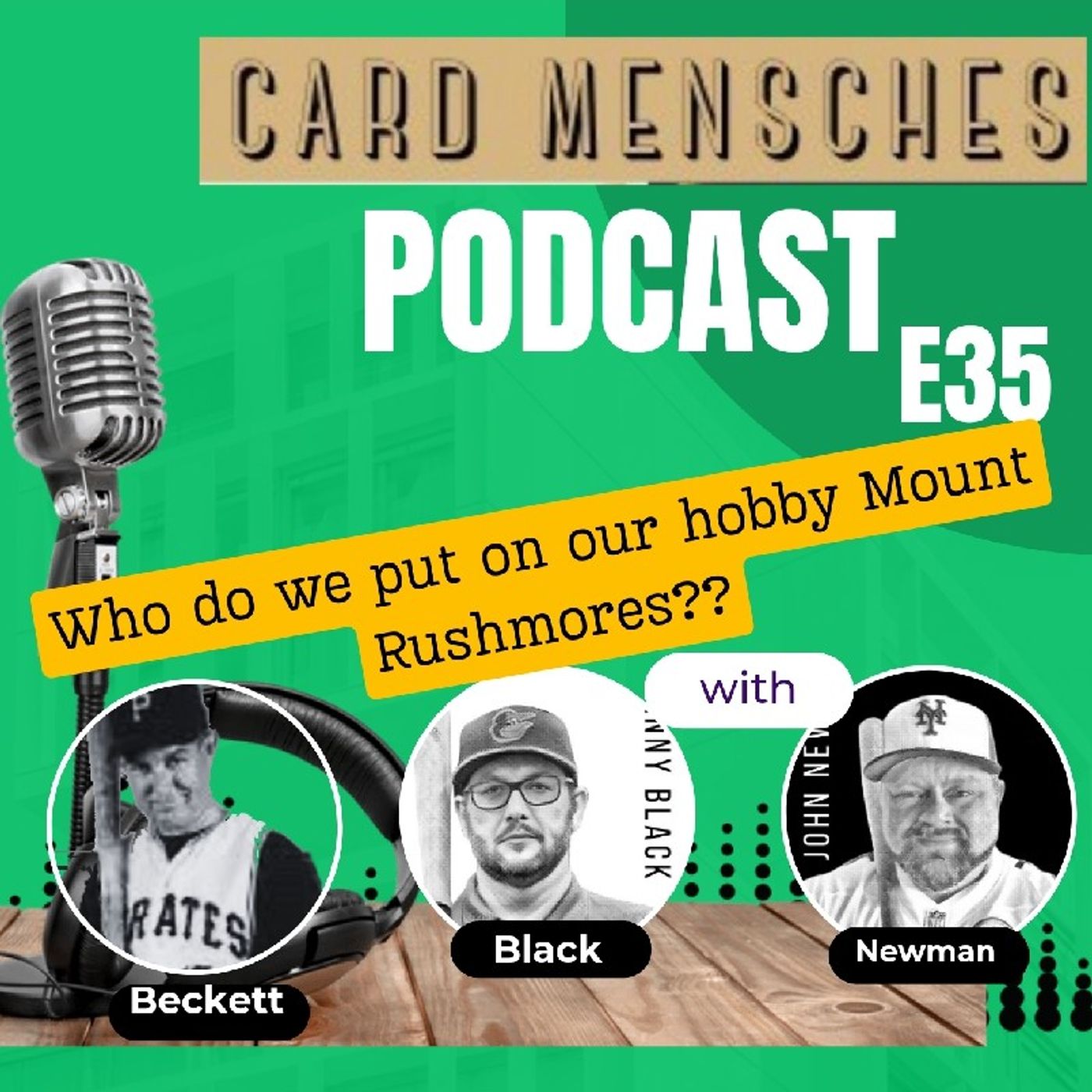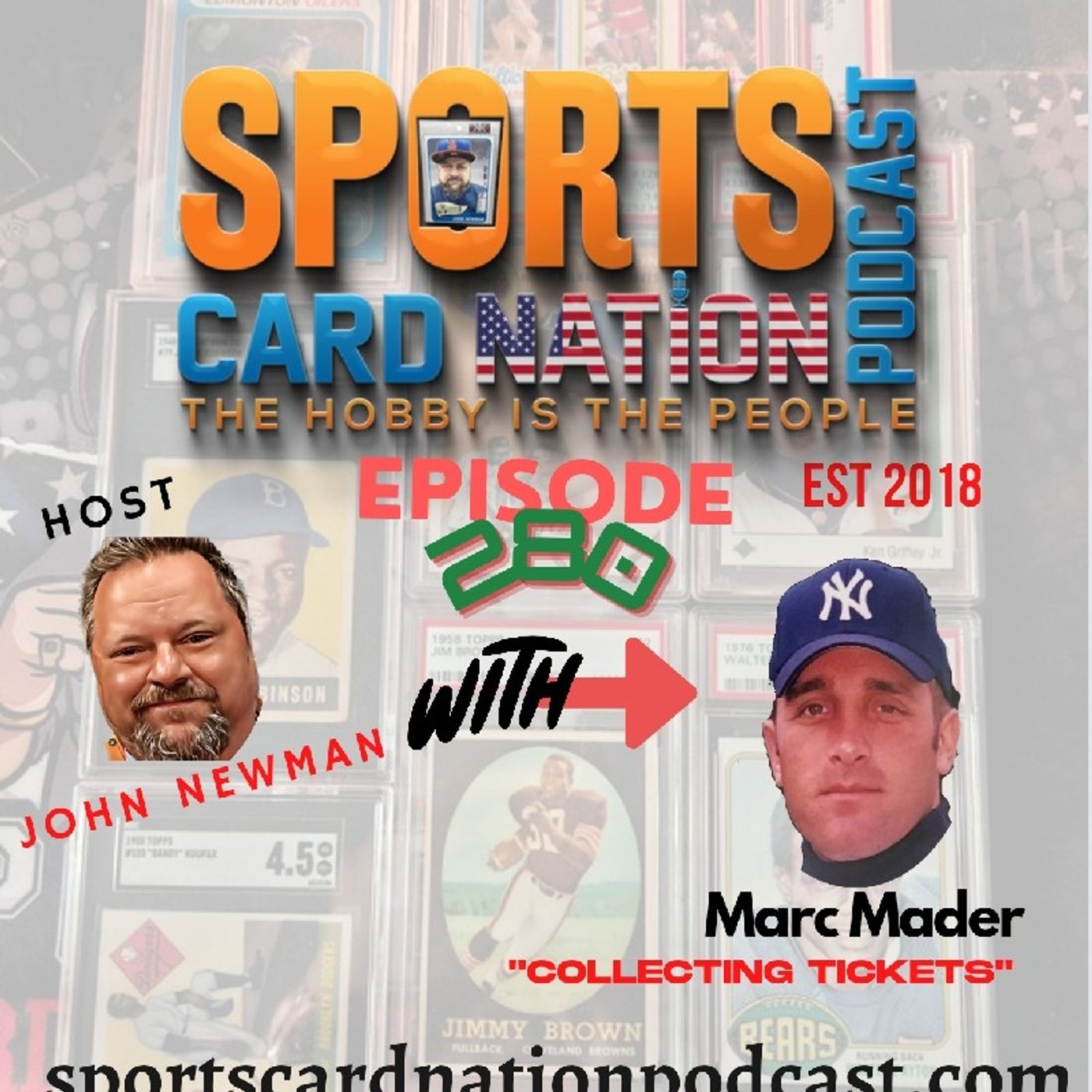Hobby Quick Hits Ep.153 Memoriam:Jim Brown w/ Dr.James Beckett
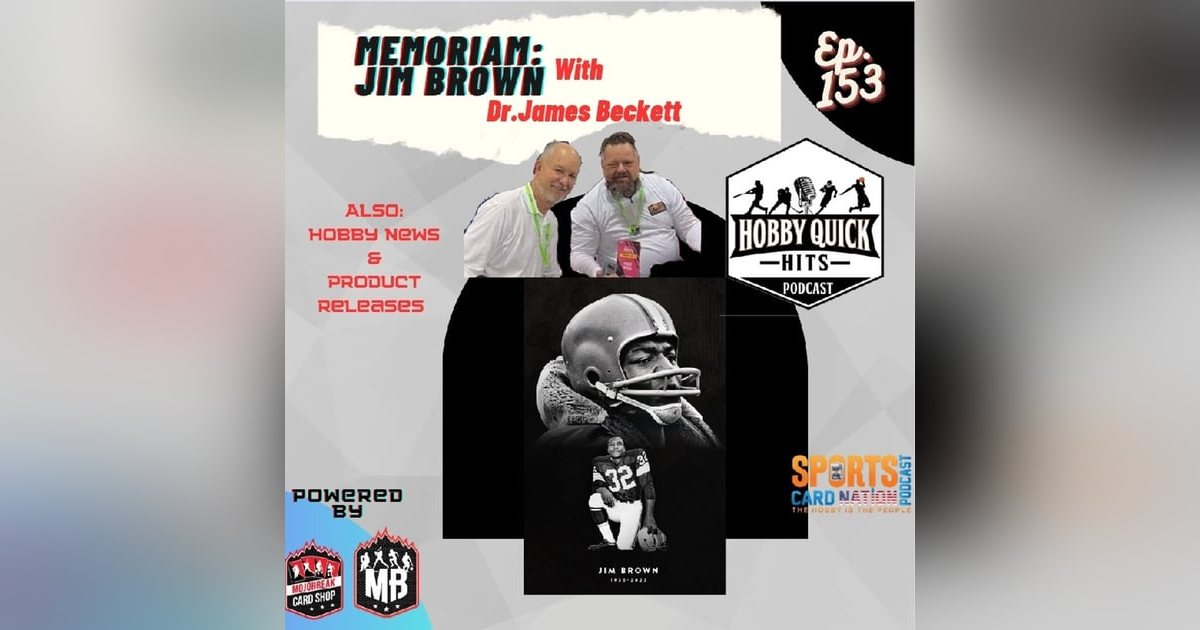
The world lost a legendary sports figure with the passing of Jim Brown. Being in Syracuse and knowing a ton about him, this Memoriam seemed apropro. Dr.James Beckett joins me to discuss the legend of Jim Brown and hobby effect.
Also:
*New Product Release Schedule
*Hobby News
Follow us on Social Media:
Website:
https://www.sportscardnationpo...
https://linktr.ee/Sportscardna...
E-Mail us at:
hobbyquickhits@gmail.com
Become a supporter of this podcast:
https://www.spreaker.com/podcast/sports-card-nation-podcast--4761791/support
.
SPEAKER 1: Hobby quick hit, delivering their breaking hobby news directly to a airline.
SPEAKER 1: I know those hot drops from the car shop.
SPEAKER 1: You've got your health.
SPEAKER 1: Your hope, Ja New Man.
SPEAKER 1: All right, welcome to episode 1 53 of Hobby Quick hits. This was not going to be the scheduled episode. I had another one already recorded and planned and then Friday, some big news happened, sad news, you know, legendary running back.
SPEAKER 1: You know, social rights activist, Jim Brown passed away at age of, 87.
SPEAKER 1: I'm here in Syracuse. I'm originally from New York City, but I'm here in Syracuse where he played his college ball ball and, you know, very revered here. I mean, obviously he's a, a national legend, arguably one of the greatest athletes of all time. But here in Syracuse, you know, we have the distinction of being where he really made a name for himself.
SPEAKER 1: So this news really hit, you know, this area pretty hard. I know he's not a, you know, at 87 he's not Super young, but, you know, it means a lot to the area. So I knew I was going to do sort of a, a retrospective and in Memoriam episode, so to replace what was going to come out.
SPEAKER 1: And you know, thankfully, Doctor James Beckett to who, you know, knows a lot about a lot. I said who better to have on to the kind of, you know, talk about Jim Brown, the, the player, the person and he'll be using some of this audio on a future sports card insights, episode as well. So look for that, in crossover form there. But I, I promise you this.
SPEAKER 1: And I, I don't make many, I don't, I don't like guarantees all the time.
SPEAKER 1: I guarantee you will learn at least one thing you didn't know probably more, but I guarantee you'll learn one thing that you didn't know about Jim Brown, on today's episode. So, before we get to that, let's get to our, our great sponsors mojo Breaks. We'll go over the, the weekly, the hobby news and what's coming out in product, form.
SPEAKER 1: And then we'll get, me, myself and, and doctor Jim, we'll discuss the legend that was Jim Brown. Don't go away.
SPEAKER 2: Mojo bricks shop dot com is the best place to get your sealed wax products and brakes. They not only have the best selection but the best prices, whether it's a box or a whole case. They are your guys, they ship worldwide to your doorstep. Their reputation as one of the most trusted in. The hobby goes unmatched. They are the 2021 tops rip Party champion Breakers from Sports card to Pokemon cards. Their selection can't be beat.
SPEAKER 2: They offer daily deals and preorders.
SPEAKER 1: Hey guys, John Newman here, Mojo prices are already great, but to save an additional 10% off, anything in their store, use the code quick hits. That's Q U IC K H I T S check out the full service store that's open seven days a week in Santa Clara, California or the website at mojo break dot com.
SPEAKER 1: All right, let's go over the releases coming out new products over the course of the next two weeks. Starting with the 24th of May 2022 23 Panini recon basketball on May 24th. You've got 2023. Top Heritage Baseball, 2023 top Star Wars Crow, 2023 top Sterling baseball.
SPEAKER 1: Also, well, next day 2025 or May 25th, 2022 23 upper deck Trilogy Hockey on the 26th, 2022 23 leaf. Best of Basketball. Also on the 26th, you have 2023 Leaf Heroes of wrestling blasters. Staying with the 26. You got 2022 23 Panini donor optic basketball. Fast break. Last day of May, you got 2023 Bowman baseball mega boxes. Also 2021 22 Leaf Pearl, multi sport.
SPEAKER 1: Also on May 31st, 2023 on comp competitors collection 2022 23. Panini impeccable basketball 2022 23 tops N B basketball, upper deck. Marvel low key season one. Rounding out the last release on the 31st 2022. Panini Don Optic football. As we go into June, you got June 1st upper deck. Marvel allure. June 2nd 2022 23 Bowman University chrome basketball that has actually come out and been moved up.
SPEAKER 1: June 2nd, 2023 Panini Don Baseball also on the 2nd, 2023 Panini Downers racing also on the second Yugi O Wild Survivors. So, a busy next couple of weeks, lots of releases, remember could be product delays or bump backs or in the case of university, moved up. So there you go. Choose your weapon. Happy ripping. Let's go round the hobby verse and catch up on this week's hobby news.
SPEAKER 1: All right, Ebay has announced that their authenticity guarantee is expanding to Canada.
SPEAKER 1: So any cards or sneakers sold for over $250 will be, go through their authentication process. I've used it a few times, with no, no hiccups. So, now expanding to Canada, now, on the same note, sort of related, you may remember the bill passed that anybody that makes over $600 on a selling platform will get a 10 99.
SPEAKER 1: Well, hold, hold your horses, Senator Gerard Brown Democrat out of Ohio and Senator Doctor Bill Cassidy Republican out of Louisiana have a red tape bill where they're, they're trying to get through, congress that, they want to change that. So you won't get one, not when you make $600 but when you make $10,000.
SPEAKER 1: So they're trying to change that minimum threshold from 600 to $10,000. I know a lot of people would, sign up for that in the heartbeat, myself included. So we'll, hold on there. We'll, we'll see what comes of that. They're trying to get it pushed through A A P Ted Williams 1966 Hall Of Fame ring presented to him by the Hall Of Fame for being inducted, just closed on heritage auctions for $444,000.
SPEAKER 1: So, pretty cool piece of history. There has a new owner and, you know, it looks like fanatics. One of their early fingerprints on the tops. Product is coming by a way of what they did with the 2023 Bowman Sapphire baseball offering. They did it Ducks Auction style.
SPEAKER 1: Yeah, you might, you might remember. That's Panini old trick. Well, fanatic slash tops, did that on the 2023 Bowman Sapphire.
SPEAKER 1: Boxes are 32 cards per box, one auto per box. It's 100 and 50 card set and they started the duck auction at $850 and then it would go down by 25 bucks every five minutes.
SPEAKER 1: And then when all the boxes are accounted for at the lowest or the highest bid that will take them all, that's what it's sold for. So the boxes brought $350. Now, I'm not a big Ducks Auction fan, but I guess it's the best way to, you know, when I always like to say right, the market should set the price.
SPEAKER 1: I guess that's the best way to see what that market price is. So Bowman Sapphire $350 A box R E A S May Encore auction is going on right now including 4000 items spanning a range of errors from 18 87 to 2019. Some of the items in this month's auction 1941 R 3 36 play ball. Joe DiMaggio graded at an S G eight in 1933.
SPEAKER 1: Gowdy Lou Gehrig S G C seven A G 1933 Goudy Babe Ruth S G C five A 1996 97 tops grown basketball factory sealed unopen box 20 packs. Yeah, that's Kobe's rookie year in 18 88 and 28. Allen and Ginter Mike King. Kelly graded P S A three more bunch of sporting news. We got Ty Cobb, Rudo A Bobby Orr rookie S G C nine second year. I take that back second year.
SPEAKER 1: A 1968 Hank Aaron S G C mint nine, an 81 tops football cello box on open 24 packs that is Joe Montana and a bunch more. One last thing, MC David and Ovechkin upper deck rookies in P S A Jim Mint 10 and again, the 8000 cards in this auction or items I should say so, cards in memorabilia ends in, in May here.
SPEAKER 1: So you got a little bit of time left to get your bids in and take home something to add to your inventory for sale. Or P or PC.
SPEAKER 1: Upper deck has announced on June 7th exclusively on their EAC platform. They will be releasing the 21 22 Fleer Ultra Hockey release. Let me go over some specs for you. So, you know what it entails, you get eight cards per pack, 15 packs per box, 10 bucks per case.
SPEAKER 1: It's a 250 card digital bass set with three levels of stacking parallels, medallion inserts, return of many vintage inserts and all new car designs from a arena design, gold spectrums, red foils, green foils, one on one printing plates, lucky 13 rookies.
SPEAKER 1: And the list goes on ultra scene, double fabulous fifties, circular die cut puck cards of your favorite players falling one per box. Head over to upper deck dot com for more information. But this product is releasing June 7th exclusively on their E P platform.
SPEAKER 1: Now, our feature presentation.
SPEAKER 1: So I'm with Doctor Jim, you know, Friday, we lost this past week, we lost a legendary athlete and, and, and gentleman, you know, and, and Brown running back for the Cleveland Browns Hall Of Famer, all that good stuff. Doctor Jim, I'm in Syracuse as you know.
SPEAKER 1: And so, here it hits, you know, I think it's, it's a, a national loss but he really made sort of his bones here at Syracuse University, where I am. So he's, he's even revered even more than, you know, on a national level, which, which he is. But, we kind of claim him here in as, you know, where he got his start and, you know, just some of your thoughts, you know, right off the top here on Jim Brown.
SPEAKER 3: Well, did we do Floyd Little you?
SPEAKER 1: And I, because he did, he kicked off a series of incredible Syracuse running backs but, but Jim Brown is, is the quintessential, I mean, he's the greatest, yeah, he is, he is in and, and in 2002 sporting news, you know, said that he was the greatest football player, of all time, you know, I always, I w when we talk, when that conversation comes up, Dr Jim about greatest athletes where it's any sport.
SPEAKER 1: It's just, they're, they're all, there's no sport, tied to you. Just the greatest athlete. He's got to be in that conversation, you know, with Jim Thorpe. Bo Jackson. I know Bo Jackson's career. It was a little, probably a little short to be really considered, but just, he's right to me it's, it's a lot of times people will tell you it's Jim Thor and, and Jim Brown and now they played obviously different errors.
SPEAKER 1: So it's always tricky sometimes to, to, you know, put them against each other. But, I mean, either way, he's arguably, you know, he played four sports at Syracuse, football, basketball, track. And here's the crazy thing. Doctor Jim, some will tell you football wasn't his best.
SPEAKER 3: Lacrosse was his number one sport, but it didn't pay.
SPEAKER 1: Yeah. E e exactly. And, and he's in the Lacrosse Hall Of Fame and he's a Syracuse is a huge Lacrosse school. We've had some great, I'm not gonna, I won't go off on that. We've had some, like, legendary names in the sport of Lacrosse and people at Syracuse and his coach, you know, his, his coaches at the time will tell you he is the best Lacrosse player Syracuse has ever had, they changed a rule because of the way he played.
SPEAKER 1: He, you know, his size, he used to hold the, the Lacrosse ball in the stick close to his body. No one could get, he'd literally run up the field. No one could get the ball out of, out of the Lacrosse stick and he'd obviously scored.
SPEAKER 1: They actually changed the rule where I, I don't know how many seconds, but you can't just keep doing that. You have to, you know, release a, away from your body. So, you know, much like we, we hear Mel Brown in football, they change the coverage rules. They like changed Lacrosse rules. For this guy, he averaged 13.1, points a game in basketball.
SPEAKER 1: I know I told you before we went, we hit record. He, he would be at practices for something. He wouldn't necessarily practice all week with the track team. But when they had a meeting, if it was home, they would literally get him out of another sports practice and say, hey, we need you and he would compete, and, and sometimes win those events.
SPEAKER 1: And so he wasn't even necessary to, like, he wasn't with the track team, you know, five days a week or whatever, he would just compete with him as an athlete. And so just a legendary player. Here's the crazy thing too as I'm kind of going up on a, he, he did not get a shift to Syracuse.
SPEAKER 1: There's some, you know, it was, it was that time that era, there was, you know, racial stuff going on as we all know, they didn't offer him scholarships.
SPEAKER 1: I, I think it was a family friend in Long Island, literally paid for him initially to go to Syracuse. He didn't start his first, he didn't, he didn't start at football when he first got to Syracuse. So just crazy, you know how the legend be became, you know, he wasn't a legend necessary coming in. He just, he made himself just being the great athlete.
SPEAKER 3: He was, you know, I I'm a sports card insight. So you think his all around greatness in all the sports, but especially football as a running back. Does that is, does he get the measure that he deserves in his card prices?
SPEAKER 3: Because he doesn't have that many cards from his career?
SPEAKER 1: No, I mean, he, he's, he, he played nine years, he was a pro bowler every year, he was a first team all pro eight of the nine years, three time M V P won the M V P and a rookie of the year in his first year.
SPEAKER 1: Obviously, he won the M V P his last year and you know, he Barry Sanders the way Barry Sanders retired in the way Jim Brown retired or sort of similar in the fact that Jim Brown was, you know, also went into acting and he was on the set of a movie and art mode, the owner of the Browns.
SPEAKER 1: You know, he, he didn't think he was gonna make it back for training camp in time because of the movie shooting and he threatened Jim Brown if you're not back in time for training camp, I'm going to suspend you here. You have your face of the franchise and you're telling this guy that and Jim Brown said, you know what I, I retire.
SPEAKER 1: So he literally art mo, you know, he didn't appreciate Art Mall's approach to that and he retired and his last year, Dr Jim, you know, he had 15, 1500 yards rushing, 17 touchdowns won.
SPEAKER 1: The M V P had just won a Super, the NFL champion, which it wasn't Super called the Super Bowl, but the, the NFL championship the year before in 1964 and he just went full time into, into movies and, and, and, you know, social justice stuff that he was, you know, big into and very important figure there.
SPEAKER 1: So he's just so multi-layered and, and like Barry, you know, that would come years later, were tied literally at the top of his game when he had more years left in him. So you a great point by you, right? He does, he, he, he had a short career but not really so much injuries.
SPEAKER 1: It's just, he just said, I'm done when, when art mode kind of took that stance and could have played for, you know, maybe 34 or five more years at, at a, at a high level. So, you know, I think his rookie card is, is probably priced with, you know, I, I have one so I, I, I'll say it, maybe it should be worth more. I think a lot of his cards have after his rookie year.
SPEAKER 1: You know, everyone wants that 58 tops. I think that they should probably be more, you know, valued than, than they probably are.
SPEAKER 3: Did you see the movie one night in Miami?
SPEAKER 3: I, I didn't, I've seen some of his movies but, you know, that was the movie a few years ago and, it was about Cassius Clay and, and, you know, Jimmy Brown and, and, you know, four different black guys, at, at the time that, that had this meeting, before the Clay Liston fight, I guess in New Orleans, I think, or Miami, whatever, I guess it was Miami.
SPEAKER 3: But, it's, he didn't get any bump from that, you know, the, the 30 for 30 series. If you, if you, if Michael Jordan gets a, a movie then, people Chase Michael Jordan cards, but I didn't see much bump there. I think there'll be some bump with the, the reflection of how great he was now that he's now that he's passed away way.
SPEAKER 3: But at 87 that's, I mean, I can't imagine him.
SPEAKER 3: He quit when he was on top. Absolutely. But it's hard to imagine him playing three more years and not having some drop off. And I think he had a, he had great pride in his ability.
SPEAKER 3: And, ok, here's my controversial question for you.
SPEAKER 3: He's a black man. He's a proud black man. Would you say he's a black men?
SPEAKER 1: Oh, man. You know, that's a, that is a hot seat question.
SPEAKER 1: I'd like to say, yes, he, he listen, he, you know, allegedly there was five incidents that were reported, you know, where he struck a, a woman. He wasn't convicted of any of them. He was convicted on a vandalism charge when he, he smashed, you know, someone, he was with window on her car.
SPEAKER 1: But not that, you know, if, if, if there was a hall of nice, you know, he probably wouldn't get into that. So, you know, I i it's, it's like what we would say with Ty Cobb in baseball, right? Maybe not the greatest person in the world.
SPEAKER 1: But I mean, you can't argue with on the field stuff. So on the field, he's a, a match. But, you know, but he also did a lot of great things. You mentioned some stuff that he did a lot of great things off, off the field with, with social justice.
SPEAKER 1: He, he, he, he, he started an anti gang organization for the violence in Southern California. So I guess you could say it. Does that cancel some of the my point.
SPEAKER 3: My point is I think he's a black men that the black people would consider him an amazing guy.
SPEAKER 3: And most of the writers are white and the, the situation he was in I, I have a fair number of black friends. Perhaps you do too and a completely different experience even when you're a great athlete and especially back in the fifties.
SPEAKER 3: And so I don't know the environment he was in, but I can see a lot of good that he, he did, but I could also see that he probably got some level of abuse and disrespect.
SPEAKER 1: Oh, no doubt. He, he had a falling out with the, the university doctor Jim because not only was he getting it at, at away games, you know, from the the opposing, you know, home stadium crowd, there was stuff going on in campus and he didn't feel Syracuse really did enough in-house stuff to.
SPEAKER 1: So for a while he did not come back.
SPEAKER 1: But he met with, he met with some officials and they buried, they buried the hatch and he, he started coming to football games and, and events at Syracuse. So, so there was, there was some love lost there between him and the university and how things have. And he did take a lot of, of, you know, like you said, abuse. He a lot of racism he encountered not only from opposing teams but even on campus from in house stuff too.
SPEAKER 3: So I'm just saying, you know, this is 10 years after Jackie Robinson, you're, you're a guy, my guy that was, you know, football had already been integrated and all that. I'm not saying that it's just that in the culture, it, it wasn't full integration in the culture.
SPEAKER 1: And so here is this guy that all of a sudden is the best kind of hands down running back, you know, to that point, you know, and maybe ever, I, I, I, I think ever, I think when you think of pure running back, I mean, even to the point, like, you know, now we see running backs stuck to Jim, you know, they get what they can, right?
SPEAKER 1: And if the, the sidelines nearby, they'll, they'll scoot out of bounds and, and live for the next play.
SPEAKER 1: That wasn't Jim Brown's motif. He was a guy that would even for another yard or two would lower his shoulder and then try to inflict some pain to the point. Coaches were like, Jim, stop doing it like you got, it was a nice run, you know, take what you got, get out of bounds, save the wear and tear on yourself.
SPEAKER 1: But that wasn't his, you know, that wasn't his M O and like your coaches had a hard time, but you've done coaching, you've done coaching, wouldn't you really appreciate if your players were all going that extra.
SPEAKER 3: I mean, you're not, I mean, unless you hit their body in some way.
SPEAKER 3: But, but, I mean, he was a tough guy and, and most football players know it's better to hit than be it.
SPEAKER 1: I think the coaches appreciated Doctor Jim. But I also think they'd rather have, you know, Jim Brown in the game for the long haul rather than the, the second guy in the depth chart. So they were trying to, you know, preserve their, their best guy.
SPEAKER 1: And, you know, I would probably, if I was coaching him, like you said, on one hand, I, I admire how, he, he was. And on the other hand, I'm like, hey, I teach you the whole game, like, can you, you know, get out of bounds? I know you don't, I know you don't like to do it.
SPEAKER 3: Blame me to get out of how many, how many times did he not show up for the game? Or was he injured?
SPEAKER 1: I think he, he really had a really good track record of he, he did show which I get which again is, is a test to the greatness of him. But when, when you're a coach, it only takes one play, right? One hit.
SPEAKER 3: That can no, but, but the other thing is, and again, I, I, I, I know the comparison to Barry Sanders, but Barry Sanders was always at risk. For a knee injury because of the different angles that he was coming at. Jim Brown was coming at you pretty straight ahead.
SPEAKER 3: And so he was, and, you know, he, he was, he was hitting people head on. I mean, Barry Sanders was in all kinds of awkward situations and, you know, completely different running style, but also went out on top.
SPEAKER 3: But if he had played a few more years, he'd be limping.
SPEAKER 1: Yeah. No, I, no doubt, I'm sure it wasn't just the mod exchange. That was why he retired. I'm sure that was sort of the, the culmination. I'm sure maybe some of that was, was on his mind.
SPEAKER 1: He was already starting to do movies, you know, even in, in the, in the Hollywood realm, he set, you know, he, he was the first, African African American to do a first interracial scene in movie history with Raquel Welch. I believe it was 1969.
SPEAKER 1: The movie was 100 rifles. So even on the big screen, he was, you know, setting records if you want to call or, you know, set it doing, doing stuff for the first time.
SPEAKER 1: So, you know, and again, social justice issues, he's very, he got into politics, supported, you know, if you heard him, he says he, he doesn't, it's not about a political Party, it's about the person who I can, can make the country better and, and including, for African Americans.
SPEAKER 1: So he would vote Republican Democrat, independent, whoever he, he felt was best for the country and, and, you know, African Americans in the country. So, you know, kind of broke, I don't wanna say broke the mold but, you know, did, it wasn't along Party lines.
SPEAKER 1: You know, he, I know he, I saw an interview where he said I voted for Obama and I voted for Trump and, one's obviously Democrat and one's Republican, but I voted for him because of what I believe they stand for and what were, what they wanted to do.
SPEAKER 3: So I think that shows you, you know, his conviction again, but sports card insights, you know, the prove conventional wisdom now is that you gotta buy quarterbacks and, and, you know, maybe then a little bit of spend a little bit of Sprinkle a little bit on the wide receivers, but running backs are a bad bet.
SPEAKER 3: But if you go back to, you know, 58 to 65 or so, the guy is Jim Brown, I mean, or Johnny, I is, is great too and he's, he's up there, Bart starr a little behind horning a little behind that.
SPEAKER 3: But if the guys that played in that period, you know, Jim Brown is the main guy, am I, you know, am I and, and, and then when you, and then you go to the late sixties and it's almost gale Sayers after that of the, of the of the number one guy and it's a running back and these were running backs that both played less than 10 years.
SPEAKER 3: But were, were when I always say, who are you gonna collect is kind of the same as when you buy a ticket to the game, who are you buying a ticket to see?
SPEAKER 3: And if it was the Cleveland Browns, it wasn't Bill Nelson, you know, or Frank Ryan, it was, or who, who was the guy back in that time.
SPEAKER 3: But it was Jim Brown.
SPEAKER 1: Yeah, no doubt. Well, one of the reasons too, Doctor Jim and, and, and, and I know, you know, this is, you know, back then it was more of a, a running game than, than the NFL is today, right where it's more of a heavier passing game.
SPEAKER 1: I mean, even when you compare quarterback numbers from the great quarterbacks of that era to today, today's quarterbacks dwarf for, that's not to say today's quarterbacks are that much better than the quarterbacks that, but it's just a sort of a different game offensives have, have changed and, and now they even use short passing game in place of, of, of running game and, and that's even in the draft, we, we rarely, this year was kind of an oddball draft.
SPEAKER 1: We saw two running backs go in the first round that that doesn't even happen anymore. They used to be in the top picks, even the best, even a Heisman winning running back sometimes may not be a first round pick. And, and that's just, I think that's a testament to the offensive mindset of coaches in the NFL.
SPEAKER 3: But even a Christian mccaffrey who's, amazing receiver as well as a really good runner.
SPEAKER 3: I, I just think there's a little bit of a bias against, running backs and it's, and the, and I think the theory is that they're not going to have long careers and yet you've got, again, Barry Sanders and, and Jim Brown who had less than 10 year careers but were stellar.
SPEAKER 3: So, I, I think, I think collectors ought to not be so dismissive of running backs that can stay healthy and, and be really good for 789 years and we got a couple that, you know, to me in today's game.
SPEAKER 1: I got a chance to be those type of guys and, you know, Derrick Henry, although he's, he's coming down, the home stretch. You got a guy like Jonathan Taylor, in Indianapolis who I think is a, a great running back that could play many more years.
SPEAKER 1: So, I think, I think, I think when, when it comes to collectors, I think a lot of people want to see it first or, and, and then sort of backtrack and try to, you know, kind of scoop up. I think they're afraid of getting burned. You know, I can't speak for every collector.
SPEAKER 3: But my, my point is, I, I'm not sure Derrick Henry was, he, he was a little bit similar to Jim Brown, but not as good. And so you're investing in Derrick Henry? Is he a game changer? Jim Brown was a game changer?
SPEAKER 1: Yeah. No, no doubt.
SPEAKER 1: I mean, when, when I'm sure when defensive coordinators had their meetings all week, it was to stop, Jim Brown that was really the focal point of their game plan, on the defensive side of things and, and you don't, you know, there's still guys like that but not like you said, not in the same sense as Jim Brown was, he was, like you said, I don't think they shut him down but they didn't, I'm saying they tried, that was the game saying they tried but Derick Henry occasionally they, they can stack the line and, and shut him down, but Gim Brown, I just think he was, it was good for 100 yards every game, I, I think, yeah, I mean, I, I think his average for Carrie was like 5.2 or 5.7 yards.
SPEAKER 1: I mean, you hand it off twice to him, you got a first down, move the chains and just matriculate up the field, as, you know, Hank would, would say and so, yeah, I mean, he was the meal ticket, right?
SPEAKER 1: For, for, for not only the Browns, I think the NFL, like you said to, to me, he was, you know, three M V P s, a championship, rookie of the year. And, you know, you couldn't stop him. Like he, he didn't really have bad games, you know, he didn't miss, much time and it was a bruising back. I mean, he wasn't gonna really outrun, run you but he'd run through you.
SPEAKER 1: I mean, someone asked me like, who's the, who's, who you, who's today? Would you compare to Jim Brown? And we, we talked about him and he's not Jim Brown. No, but probably Derrick Henry's style is the closest to, today's player to what Jim Brown was, in the fifties and, and, and sixties and, you know, they don't make him really like that anymore.
SPEAKER 3: He would be, you know, it's like you probably did playground sports like I did, you know, he's the first guy picked on the playground, you know, and he could play whatever position he wants to play, you know, he, he, he could have played linebacker, he could have played off.
SPEAKER 1: He did, he did play, here's a crazy thing. He did, he did play defense at and, and, and some crucial moments. He did play on the other side of the ball. He wasn't playing Ironman football where he was playing both sides of the ball all game, but he does have defensive, he kicked at Syracuse, as well.
SPEAKER 1: So he was a kicker, he played some defense, you know, in high school, he went to, he was in, in Long Island in high school. He, he was the all time average scoring record until another Hall Of Famer that you might recognize came along afterwards and, and, and broke that record. Krems broke Jim Brown's basketball average per game scoring record.
SPEAKER 1: So for, for many years, Gim Brown was the average points per game leader in Long Island high school history and then K Strumsky took, took that title away. So there's just so much, I mean, you know, there you got two Hall Of Famers in, in different sports but yet that was basketball.
SPEAKER 1: And that just shows you that the athletes they were and, and, and Zemsky himself as well.
SPEAKER 3: Yeah, my let's see, my last sports card insight. What was it gonna be? Gosh, I forgot what I was gonna say. Let me think about that you were talking about.
SPEAKER 1: Well, here's another thing people probably, you know, probably didn't realize he served in the military Reserves. He was in the, in the Reserves. So he served for this country. I don't think that gets talked about a lot. Doctor Jim, you know, it's not the first, obviously, it's not, not at the top of the list with his athletes. But you know, some people may know that. But some people may not, he was in, in the, the military.
SPEAKER 1: So, you know, he, he served his country, cared about political things he cared about this country. You know, one of the first things he did when he retired was, you know, you talked about it, him himself, Muhammad Ali Kareem Abdul, Jabbar, Bill Russell.
SPEAKER 1: They formed you know, an organization for, for social justice and, and, and rights and those are all huge names obviously and so packed a lot of packed a lot, lot of clout and you know, cared enough to, you know, to, to do that, put themselves out there.
SPEAKER 1: I know, I know Jim Brown was very critical of Michael Jordan Tiger Woods. He, he said he felt like they didn't use the platform, they had to take more of a stand that they could have that they were a little bit, I think he called them sort of selfish rather than, you know, you know, taking a stand and, and, and that sort of thing.
SPEAKER 1: He was very critical of, of certain athletes who didn't do things that they, they could have with, with the power they had. So he was a big voice, you know, on the field, obviously as a player.
SPEAKER 1: And even when his career was over, even past films, you know, just in, in social justices and in social climates and change. He, he was right there at the, at the forefront of that.
SPEAKER 3: I mean, basically, again, the conventional wisdom is when somebody dies, their card prices go up for a little while and then they come down. I think this could be an exception because when Jim Brown goes under the microscope, now that he's passed away, I think people are, will be amazed if they look at the clips, they look at the stats and, and, and, and translate it and converted to modern day metrics.
SPEAKER 3: This guy was like a babe Ruth head and shoulders above his peers.
SPEAKER 3: And so I don't know that it's gonna bump up and then drop back down, it could bump up and stay up because this guy was the real deal. So that, that's my final sports card insight.
SPEAKER 3: Is that again, people that just think that everything is, this is just the way it is guy dies, the cards go up and then it, two weeks later it goes down.
SPEAKER 3: I'm not so sure that's gonna be the case here. This guy's a genuine hero, especially to black men.
SPEAKER 3: You know, he, he, he, he was a complicated guy. I'm not denying that, but I've never been black. And so, you know, I've never been an all pro, you know, all world running back either. And the challenges of that are, are, are pretty, pretty, pretty amazing.
SPEAKER 1: Yeah, he's, he's a, I, I agree with you. I think, I think there's going to be obviously a bump, because of his pass and then I do agree. I think they're gonna, that bump is gonna be a permanent one and I think it should be and, I think we, even some of the, the cards, non rookie. Right.
SPEAKER 1: We're gonna see maybe more of a demand for that. Right. And, you know, the other, when someone only plays nine years, it's easier, let's say to get, you know, the, the all the run of, of their playing, you know, cards in comparison to someone who plays 2025 years.
SPEAKER 1: So I think there'll be some people that say, you know what, he's, he played nine years, let me get the rookie and let me start getting the second year and then, and so on and, and so forth. And so I think we'll see a, a run up of, of all his cards. And like you said, that's traditionally what happens when a Hall Of Famer passes away.
SPEAKER 1: But the, you know, besides a Hall Of Famer, like you said, it's probably not gonna be another Jim Brown ever again. You, you hear people who, who played with them, played against them, They asked those, those former players, you know, who, who do you like, you know, in today's game, who would you compare?
SPEAKER 1: And then usually the general consensus is no one, there's only one Jim Brown, I'm not even gonna, I'm not even to mention with all due respect and I gotta mention another player in the same, same vein. So it's, it's Jim Brown and then a lot of other great, running backs.
SPEAKER 3: And so, and those are from people who played the game, he, he was the best guy on the field and when I watched his games, that's really what it was, you know, I mean, he was the best guy on the field yet.
SPEAKER 1: No doubt, no doubt. And, you know, here in Syracuse, you know, I mean, like, you know, he's 87 but, he, he meant a lot to, to the program, especially after they sort of mended fences and he was coming back here on, on a pretty regular basis. So, at, at 11 little tidbit that many may not know.
SPEAKER 1: You know, Jim Brown passed away 60 years to the day that Ernie Davis passed away. So exactly 60 years later, Jim Brown passed and there's some sort of symbolic day, you know, it went, it went Jim Brown.
SPEAKER 1: Jim Brown recruited Ernie Davis to see recuse. Ernie Davis recruited Floyd Little to Syracuse.
SPEAKER 1: And, you know, when I, when I, when I heard that it was 60 years to the day when Ernie Davis, unfortunately, way too young. And before his NFL career started, from Leukemia and here's the crazy thing you, you, you know, the Browns drafted Ernie Davis and they had Jim Brown was set up to be sort of a 12 Syracuse backfield punch with Jim Brown and Ernie Davis.
SPEAKER 1: And, unfortunately, it wasn't to be, you know, Ernie, took sick and, never, never got in a regular season game. But, that would have been something to, to see, obviously.
SPEAKER 1: Well, obviously it's, it's sad to lose, you know, a legendary player such as Jim Brown. But the, you know, it was, it was great talking with Doctor Jim getting his thoughts, you know, he saw him play, I lived through highlights and stories and, and that, but you know, I, I know Doctor Jim always does shows, you know, when a legendary, whether it be a hobby figure or a athlete passes, he usually does a tribute to, to them.
SPEAKER 1: And so I knew he would do it. So I kind of reached out to him and said, hey, I, you know, I'm in Syracuse. I know a lot about him. Do you want to do it? And he was gracious.
SPEAKER 1: His show was also out today as well. Sports card insights with both of us waxing poetic about Jim Brown. So if you're listening to this, head over to the doctor podcast card insights, and get that as well. His is a little shorter than this show at around 12 to 15 minutes. So check them both out. We appreciate you listening.
SPEAKER 1: If you enjoy the show, we appreciate positive reviews. We ask you to be well, take care and we'll see you very soon.








